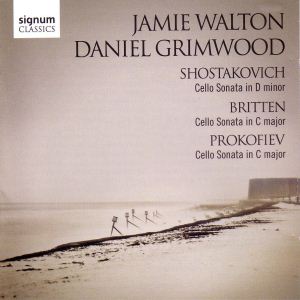 |
 |
|


alternatively
CD: MDT
AmazonUK
AmazonUS
|
Dmitri SHOSTAKOVICH (1906-1975)
Cello Sonata in D minor, Op. 40 (1934) [26:29]
Benjamin BRITTEN (1913-1976)
Cello Sonata in C major, Op. 65 (1961) [18:39]
Sergei PROKOFIEV (1891-1953)
Cello Sonata in C major, Op, 119 (1949) [22:15]
 Jamie Walton (cello); Daniel Grimwood (piano)
Jamie Walton (cello); Daniel Grimwood (piano)
rec. 16-18 February 2011, Wyastone Leys Concert Hall, Monmouthshire,
Wales
 SIGNUM CLASSICS SIGCD274 [67:26]
SIGNUM CLASSICS SIGCD274 [67:26]
|
|
|
Even if Shostakovich the symphonist had barely begun to emerge,
he nonetheless had several masterworks to his credit in 1934
when he composed his Cello Sonata. One of these was the opera
Lady Macbeth of the Mtsensk District, the work that provoked
Stalin’s disapproval, propelling the composer into years
of artistic limbo. The sonata is in four movements, and although
the overall tone is more lyrical and genial than we associate
with this composer, the minor key close of the first movement
is not the only passage to feature the typical Shostakovich
combination of sardonic humour and near-despair. The second
movement is a ferocious scherzo - Jamie Walton tears into this
in impressive fashion - but the passionate, deeply felt slow
movement is the heart of the work. There are many rival versions
of this sonata. I particularly admire the robust and dramatic
reading from Han-Na Chang and Antonio Pappano, a not particularly
generous coupling on EMI of her outstanding performance of the
First Cello Concerto. The slow movement of the present performance
seems underplayed when compared to Chang, and the reading as
a whole is richer and more mellow. I wasn’t totally convinced
at first, but on subsequent hearings I’ve happily come
round to Walton’s and Grimwood’s view of the work.
Prokofiev composed his Cello Sonata for Mstislav Rostropovich,
who gave the first performance in 1950, with Richter, no less,
at the piano. The pianist tells the story of playing it to two
different judging panels, apparently for authorisation to give
the work in public. I wonder if present-day artists in the free
world can really imagine what it is like to work under such
conditions. There was perhaps relatively little official opposition
to this sonata, as it is a predominantly lyrical work, with
none of the harmonic daring associated with the younger composer.
The first impression the work gives is a carefree one, but subsequent
listening reveals much more. The work is beautifully written
for the two instruments; the composer clearly wanted to exploit
the cellist’s sound in the low register. The first movement
is a fine example of Prokofiev’s gift for melody, with
an amusing passage where the two instruments imitate each other,
and a poignant, chiming close. Even the wittily ironic second
movement scherzo has a more lyrical interlude and the energetic
finale has a surprisingly dramatic finish.
Britten was introduced to Rostropovich by Shostakovich at the
first British performance of the latter’s First Cello
Concerto, and their friendship endured until the composer’s
death in 1976. The Cello Sonata was the first of five works
that Britten composed for Rostropovich. The most concentrated
of the three works on this disc, its five movements are over
and done with in less than twenty minutes. A motif of only two
notes makes up most of the thematic material of the first movement.
Wistful in mood for much of its length, and often touchingly
lyrical, it also features passages more powerful and overtly
demonstrative than is usual from this composer. The second movement
is a nocturnal scherzo whose pizzicato writing could almost
have come from Bartók’s pen. An expressive, melancholy
slow movement follows, then a weird march, and the work ends
with a fearsome moto perpetuo. The cellist’s wife,
Galina Vishnevskaya, apparently found the work to be a portrait
of her husband’s wildly changing moods. This may be so,
but there is a certain greyness about the writing too, and one
is left at the end of the work not quite sure what the composer
was aiming at.
Cellists hoping for a place on the world stage all have the
same cross to bear, and that is the inevitable comparison with
Rostropovich. If they are wise, they learn from him whilst forging
their own sound and personality. The only time I ever saw him
in concert he played with a barely controlled frenzy that bordered
on the demented. Jamie Walton’s playing is several degrees
cooler than this, and this shows in the performance of the Britten.
Yet whilst Rostropovich’s performance, with Britten at
the piano, is indispensable in any Britten collection, this
performance is just as fine in its own way. Walton’s sound
is gorgeous, as is that of Daniel Grimwood, made evident in
the rich and immediate Signum recording. Both players are technically
flawless, play with the utmost musical intelligence and sensitivity,
and are totally at one in all three works.
The magnificent Dutch cellist Peter Wispelwey has exactly this
programme on a well-received Channel Classics CD. I have not
heard it, but it is hard to imagine how it can surpass this
outstanding disc.
William Hedley
|
|




 All Nimbus reviews
All Nimbus reviews








